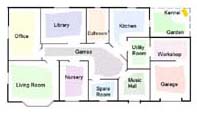Genealogy and
Family History
If you are about to begin creating your
family tree, using either specialist software, a paper
tree or are you putting together a family history album to pass down
to the grandchildren you may be wondering where to start!
Help
is at hand - there is a site which will
guide you every step of the way.
If, however, you have already started
researching your family tree you too will also find this web site of
interest and helpful through the member boards, new contacts etc. You can
also share your interests and know how with others and add useful hints
and tips for others just starting their tree.
The site in question have kindly given permission for the reproduction of the
information to get you started.
GETTING STARTED
What is the difference? Genealogy is the
study of our ancestors, usually through lineage, commonly the male line.
Family history is about our recent past, the olden days, how our ancestors
lived, worked and played. Genealogy on its own, for some, can become
monotonous, but combined with family history it will give us an insight
into how our ancestors lived. Using old family photographs can also
provide useful clues. The quest for your past can be fascinating and
rewarding. As a hobby, researching genealogy and family history can be
fun, rewarding and compelling.
-
Decide
what your aim is. Do you want to trace the male or female line only in
your family, or do you want to build your tree with ancestors as far
back as you can go, or perhaps you might just want to study the recent
past of your family history
-
Start
with the present, write down your immediate family names, i.e. mum,
dad, brother(s), sister(s), grandparents. Then add as much as you can
about them, i.e. date of births, marriages and deaths. Interview
relatives and make sure you write down all the
information gathered, this is the most important thing to do. You will
get laden with lots of notes, documentation and paper work, but make
sure you keep yourself organised.
-
Talk
to older family members to find out names, dates and any information,
events and happenings that they can remember has taken place, making
sure that you write down all the facts. Ask them about their
schooling, what they played with and what they did for fun, where they
lived, where they worked and what historical events have happened or
affected them, this will help to build up a picture of their
lifestyle.
-
Get
all your old photos, documents, birth/marriage/death certificates,
letters etc together to see what they can tell you about your
family’s history.
-
Please
let living relatives know that you are researching and building a
family tree and ask their permission if you intend using any of their
photos or documentation on the internet.
-
Join
the Library, History Groups and use the Internet. Use and search sites
such as this one to glean as much information as possible from each
source and other like minded members.
-
Visit
Record Offices, check out addresses in the Library.
If you live too far away, or you want to save on the leg work, post a
message for a “look up” in the Forum.
Other members visiting a Records Office might undertake an extra
search whilst they are there, on your behalf. Or alternatively if you
are visiting a Record Office, offer your services to do look ups for
others.
-
It
is very important that you always write down, make notes or keep a log
on your pc of the information that you have found in your research,
dates, names, places etc, it would be burdensome to have to go back
and research the same person again, because you had forgotten what you
had read!
-
When
you are satisfied that you have all the information you need, to add
an entry in your tree, you can then transfer it to the software you
have installed to create your family tree, or perhaps you are using a spreadsheet
package to add your entries into.
-
Do
not try to research too many surnames at once. Start with one and work
through. When you come to a broken branch, then try starting a new
branch in your tree.
-
Don’t
forget to take photocopies of original documentation and give back the
originals to members of the family who may have lent them to you.
I hope this has whetted your
appetite and you are ready to begin researching your family tree?
Copyright © 2000-2020
Hints and Things
All Rights Reserved.
No portion of this site may be reproduced or redistributed without prior
written permission from Hints and Things. All trademarks & copyrights
throughout Hints and Things remain the property of their respective
owners.
Hints and Things cannot be
held responsible for any information given on this site nor do they
necessarily agree with, or endorse, the views given by third parties.
|

